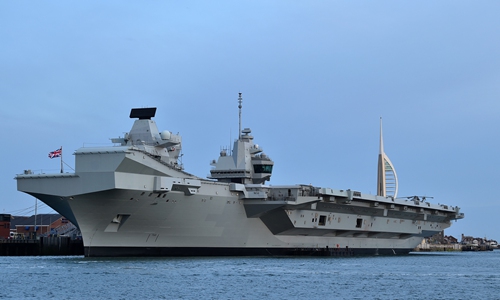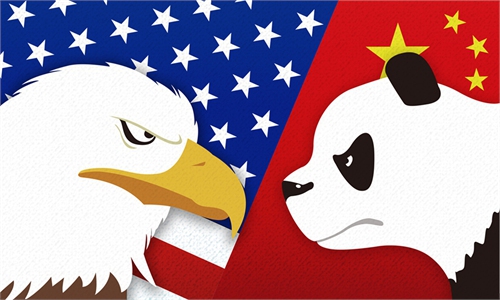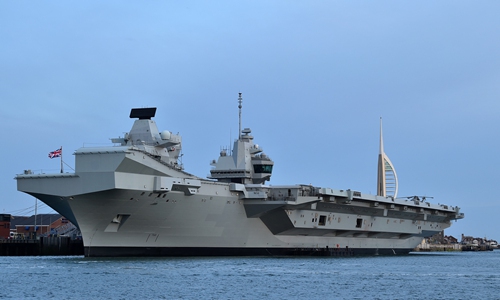
The HMS Queen Elizabeth aircraft carrier is pictured at anchor on the Solent, following an event to commemorate the 75th anniversary of the D-Day landings, in Portsmouth, southern England, on June 5, 2019. Photo: AFP
As the US, France, Japan and Australia are holding joint military exercises in the East China Sea, Foreign Policy of the US published an article asserting that "with the British sending the HMS Queen Elizabeth to the region, and the French having joined the Quad nations in maritime exercises in April, these two nations have the potential to help buttress regular Quad activities and complement the more limited capabilities of the Japanese, Indians, and Australians."Such a view is not out of thin air. It reflects the trend of the US to draw major European countries such as Britain and France into the framework of the Quad mechanism and strengthen its balance against China.
The US has been trying to build a military alliance against China in the Asia-Pacific region, the point of which is to pull its Asian allies and NATO allies together. But it lacks the strength to achieve that.
Drawing Britain and France into the Quad mechanism can expand the scope of US' Indo-Pacific Strategy and further enhance its strategic value. The importance the US attaches to Britain and France is also related to their strength. Britain and France are two big military powers, two nuclear powers, as well as two permanent members of the United Nations Security Council. Compared with Japan, whose military power is limited by Article 9 of the Japanese Constitution, and India and Australia, whose military might is relatively weak, if Britain and France can join the Quad, the group's strength will certainly improve a lot more. More importantly, the involvement of these European powers will pave the way for more EU and NATO involvement in Indo-Pacific affairs.
However, Britain and France should be very clear about US' current actions and objectives, and will not easily become the part of the group as the US wishes.
In addition to echoing the strategic needs of the US, the active military involvement of Britain and France in Indo-Pacific affairs also has some considerations of their own interests. Britain and France are traditional colonial empires in the Asia-Pacific region. Both Britain and France regard the Indo-Pacific as a region of great strategic significance. But the goals of Britain and France in the Indo-Pacific region are different from those of the US. Not only Britain and France, but also the European Union and Germany have their own versions of the Indo-Pacific strategy.
Britain and France regard China as a systemic rival, and hope to constrain China through cooperation with US' Indo-Pacific mechanism. But it should be noted that US' Indo-Pacific Strategy is designed to contain China, while what Britain and France want is to become more involved in Asia-Pacific affairs and expand their influence.
In fact, Britain and France are not at odds with China on either strategy or security. There is no need for Britain and France to get involved deeply. At the same time, China is also the most important economic and trade partner of Europe and the most important partner in the field of global governance. All these determine that it is difficult for Britain, France and even other European countries to join the Quad.
After Brexit, the UK put forward the strategic concept of a "Global Britain" and sent an aircraft carrier, the HMS Queen Elizabeth, to the Indo-Pacific region regardless of the cost. This is all aimed at regaining its global identity and influence.
Britain is set to send the HMS Queen Elizabeth to the Indo-Pacific region, and France has joined maritime exercises in the region. But the starting point of British and French involvement in the Indo-Pacific region is different from that of the US. They want to emphasize their presence but they are reluctant to irritate China.
Judging from the current situation, Britain and France following the US on some issues is only a short-term strategy. If China performs well in dealing with China-US relations and its policy toward Europe, both Britain and France will be relatively restrained and their involvement in the Indo-Pacific region will be very limited.
Sun Keqin is a research fellow at the China Institutes of Contemporary International Relations and Wang Ruiping is a lecturer at the Belt and Road Research Institute of Beijing Foreign Studies University. opinion@globaltimes.com.cn


